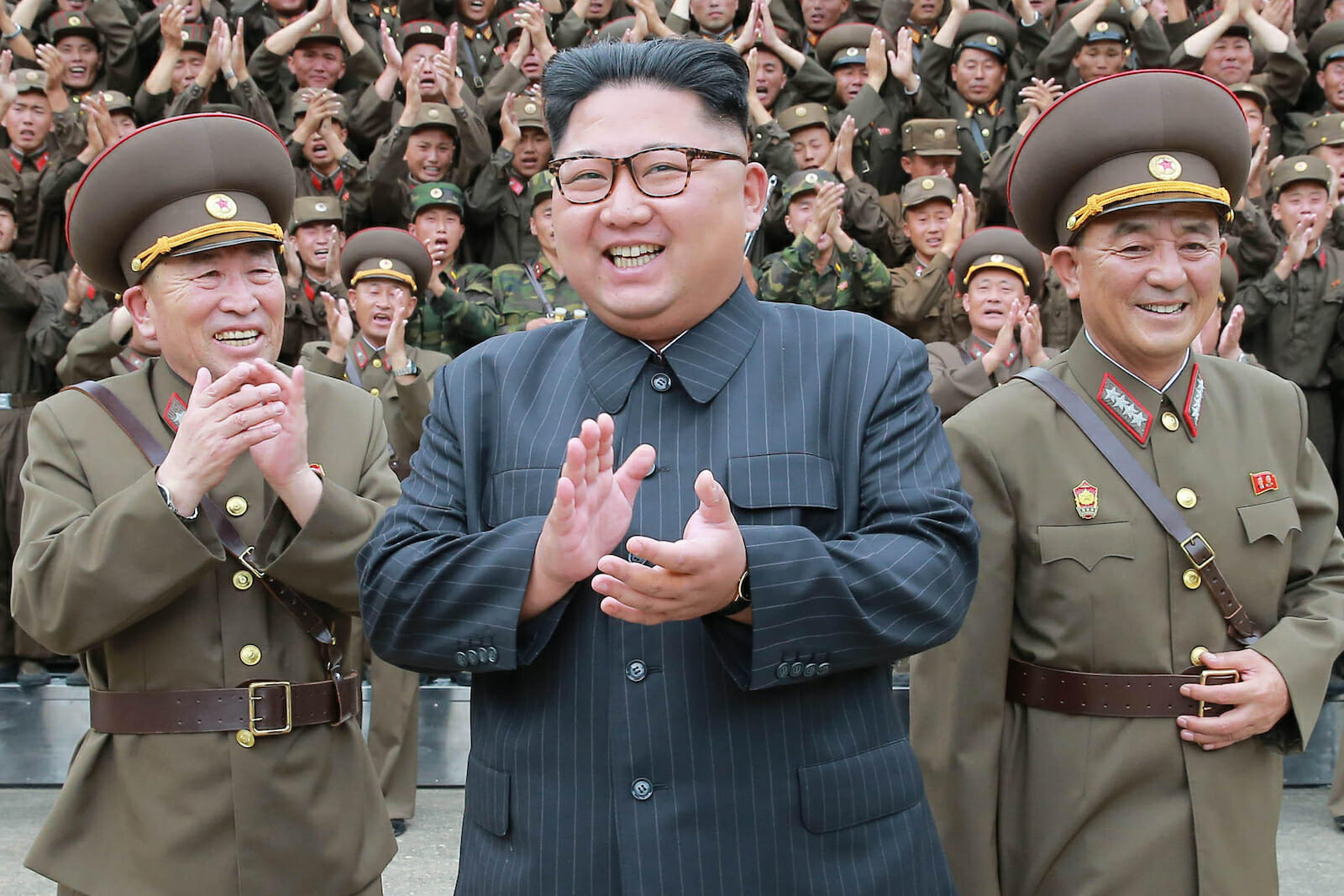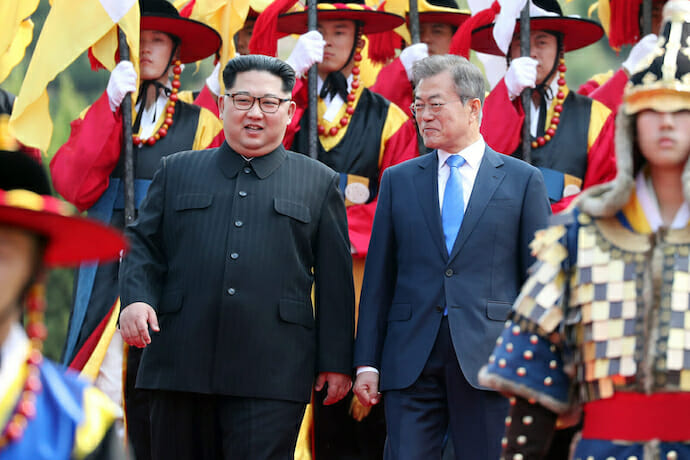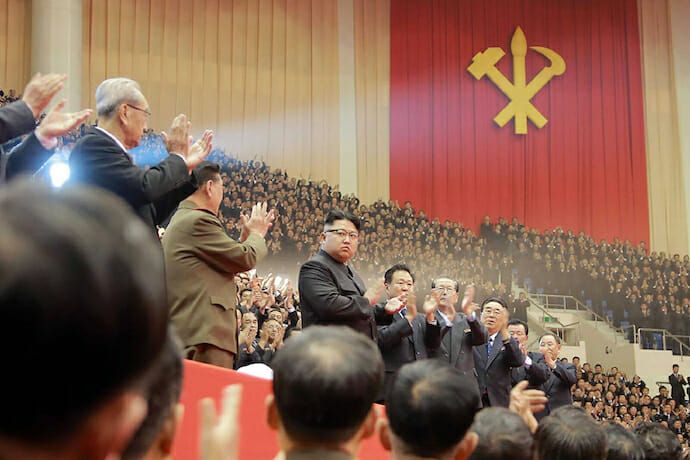
It’s Not Just Trump: Why North Korea Won’t Denuclearize
Ever the showman, President Donald Trump followed the G20 summit in Japan by becoming the first sitting U.S. president to set foot in North Korea and reestablishing denuclearization negotiations. Pundits, North Korea experts, 2020 Democratic presidential candidates, and Democratic party leaders were quick to lambast the meeting, arguing that it was “squandering American influence,” “legitimizing” Kim Jong-Un, and “one of the worst few days in American foreign policy.”
Many argue Trump’s reality-TV diplomacy will not result in the denuclearization of North Korea. They give Trump too much credit. North Korea will not denuclearize because of an established American history of intervention, mixed-signals, and unambitious denuclearization efforts.
Hard bargaining legitimizes Kim’s leadership and scores political points domestically. More importantly, a nuclear capability may be the only thing preventing the international community from intervening in North Korean affairs. The U.S. has a history of withdrawing support from, and even overthrowing, states that have willingly relinquished their nuclear programs.
Consider the case of Libya, which John Bolton has argued as a potential model for North Korean disarmament. Muammar Qaddafi’s abrupt 2003 announcement of his intention to discontinue Libya’s nascent nuclear weapons program was a sort of best-case scenario of non-proliferation. In exchange for improved economic and diplomatic relations with the U.S. and the West, Qaddafi’s government was remarkably cooperative, welcoming international monitors to oversee its compliance, acceding to international non-proliferation agreements, and even calling upon other states to discontinue their nuclear programs. But eight years later, U.S.-Libya relations crumbled. Facing reports of human rights abuses and rhetoric from the Qaddafi regime that revealed a potential genocide, the Obama administration authorized NATO air strikes that ultimately enabled its overthrow.

Although Trump has displayed less interest than his predecessors in punishing state-sponsored human rights abuses, disarmament would nonetheless make North Korea vulnerable to more forceful international criticism, and perhaps even action, on its dismal human rights record.
The case of Iraq is similar. Although inspectors from the International Atomic Energy Agency (IAEA) verified that Iraq’s WMD programs had been dismantled, the Bush administration launched the Iraq War on the allegation that Iraq had renewed its pursuit of nuclear weapons. Like Libya, the regime that willingly conceded to U.S. demands for disarmament was toppled by the U.S. military.
North Korea blames the regime changes in both states on their unwillingness to disarm, stating “The Saddam Hussein regime in Iraq and the Qaddafi regime in Libya could not escape the fate of destruction after being deprived of their foundations for nuclear development and giving up nuclear programs of their own accord.”
U.S. presidents have struggled to articulate a consistent message regarding North Korea. On the one hand, departing from Clinton’s policy of engagement and the 1994 Agreed Framework, Bush labeled North Korea a member of his Axis of Evil, noting “America will do what is necessary to ensure our nation’s security.” Similarly, Obama stated he: “will not hesitate to use our military might.” And lest we forget, it was Trump that ratcheted up tensions with North Korea by threatening “fire and fury like the world has never seen.”
On the other hand, they all sought peaceful engagement with North Korea. Bush through the Six-Party Talks, Obama secured a brief halt of North Korean nuclear testing, and Trump characterizes his relationship with Kim as a “Great Friendship.” A tit-for-tat strategy may be the norm, but not all nations have the luxury of turning on a dime like the U.S.

Apparent is an American desire to have it both ways, seeking greater cooperation, while resorting to the language of fire and fury whenever North Korea misbehaves. While doing so appeals to a segment of the American electorate, it diminishes the U.S.’ negotiating credibility, as North Korea is unable to trust American intentions. Another interpretation is North Korea knows exactly what it wants and can point to U.S. waffling to justify its inaction.
Indeed, in April 2019 Kim stated: “Though the United States calls for a negotiated settlement of issues, it is stirring up hostility to us day after day, which is an act that is as foolish and risky as an attempt to put out a fire with oil.”
The U.S. made clear to the world the power, clout, and security that nuclear weapons brought when it dropped them on Hiroshima and Nagasaki. U.S. anti-nuclear actions have not been as ambitious or quick as necessary. Observers may point to U.S. led efforts that have resulted in an 85% reduction in global nuclear stockpiles, yet for weak states such as North Korea, there is no qualitative difference between 30,000 warheads and 6,000 warheads.
Concerning disarmament and non-proliferation, the U.S. suffers a legitimacy deficit. The future of the Treaty on the Non-proliferation of Nuclear Weapons (NPT) is in doubt, as non-nuclear states have grown frustrated with the piecemeal approach to non-proliferation and disarmament. The U.S. has been perfectly willing to criticize North Korea (here, here, and here) and Iran (here, and here), while committing $1 trillion to renovate its nuclear arsenal and announcing its withdrawal from the Intermediate-Range Nuclear Forces (INF) arms control treaty. Additionally, the Trump administration has made no effort to extend the New START Treaty, set to expire in 2021. When Trump has promised to make American nuclear capability “top of the pack,” there are few carrots the U.S. can offer that does not seem entirely self-serving.
North Korea is also mindful of the U.S.’ constant military build-up. Approving a 2019 defense budget of $717 billion, Trump proudly stated: “we are going to strengthen our military like never ever before and that’s what we did.” Meanwhile, the continued escalation of tensions with Russia and threats to “invade” Venezuela leave little uncertainty what this militarization is meant to accomplish. It certainly does not help that one-third of Americans would support a preemptive strike on North Korea.
This is not to argue that North Korea is blameless – its mercurial nature and flagrant disregard of its commitments more than warrants scrutiny. However, since the end of WWII, the U.S. has shown that it respects nuclear deterrence and nuclear weapons buy a seat at the table. If the U.S. is serious about getting North Korea to denuclearize, it needs to take steps towards reining in its militarization, which includes more aggressive disarmament.


